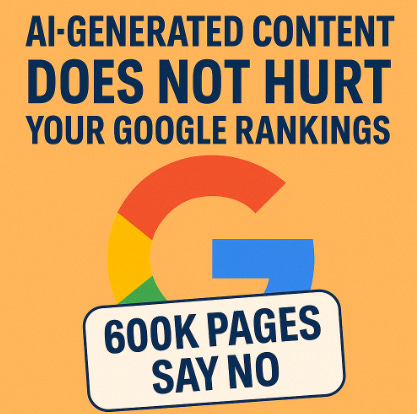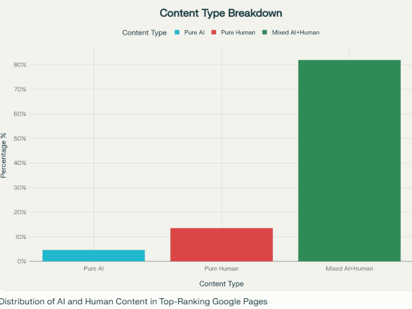Busting AI Content Myth Costing You Market Share: What 600K Pages Tell Us About Google Rankings
How to create top notch content without getting in trouble
Over the past year, whether I’ve been mentoring founders, advising businesses, or working with content teams, I keep hearing the same nervous question:
“Won’t Google punish us if we use AI for content?”
This anxiety is everywhere, from startups sweating over their first blog to global enterprises debating AI-driven knowledge hubs. It’s understandable, but it’s misplaced. The truth: Google doesn’t care whether words were typed by a human or suggested by a machine. It cares whether those words are helpful, clear, and trustworthy.
And the data backs it up.
What 600,000 Pages Actually Tell Us
Ahrefs recently analyzed 600,000 top-ranking web pages to settle the AI penalty debate once and for all. The findings should fundamentally change how every business and creator thinks about content creation.
86.5% of top-ranking pages contain AI-generated content. If Google were punishing AI usage, would nearly 9 out of 10 first-page results be using it? Even more striking: 4.6% of top-ranking pages are pure AI content, dominating search results alongside human-created content.
The correlation between AI usage and search rankings? Effectively zero (or more precisely, 0.011). Google doesn't care how you create your content, but they deeply care whether it helps their users.
The Hybrid Advantage
Here’s the nuance: while AI doesn’t hurt rankings, the very top results (#1 positions) skew toward less pure AI.
Not because Google prefers humans, but because the best pages balance AI’s efficiency with human insight. The most useful (and therefore the best-performing) content combined human insight with AI efficiency, not AI generation with human review.
13.8% had minimal AI (1–10% of content)
40% had moderate AI (11–40%)
20.3% had substantial AI (41–70%)
7.8% were mostly AI (71–99%)
The Strategic Framework That Actually Works
After implementing AI content strategies across organizations of every size, from bootstrapped startups to enterprise teams, here's the framework that consistently delivers results:
Start with Human Strategy: Your market insights, customer understanding, and strategic positioning remain irreplaceable. AI can't replicate the deep customer conversations that inform your content direction or the industry expertise that makes your perspective unique.
Amplify with AI Assistance: Use AI for research acceleration, first-draft generation, headline optimization, and content variation testing. The goal isn't replacement but it's multiplication of your existing capabilities in your own voice.
Maintain Quality Control: Every piece must solve a real customer problem and reflect your brand voice. The best-performing content combines AI efficiency with human editorial judgment.
Measure and Iterate: Track engagement, conversion, and search performance. The data will tell you what's working better than any AI detector ever could.
I can’t overstate the importance of editorial quality: Bankrate and CNET both use AI-assisted content at scale and ranked highly , until low-quality editing caused backlash, proving the real risk is sloppy oversight, not AI itself.
The Real Competition Is Time, Not Technology
43% of marketing practitioners face heightened demands to scale content output while keeping it personalized and relevant. Your competitors aren't just using AI to write faster, they're using it to test more ideas, iterate quicker, and respond to market changes in real-time.
Consider two companies I've worked with in the same vertical. Company A spent six months crafting the "perfect" content strategy, publishing sporadically while obsessing over every word. Company B used AI to rapidly test 20 different content angles, identified what resonated, then doubled down on what worked.
Guess which one captured more market share?
The velocity advantage compounds quickly. While perfectionist teams debate AI ethics, their AI-assisted competitors are gathering data, learning from real audience feedback, and optimizing based on actual performance rather than theoretical concerns.
Your Next Move
Google has spoken through their actions: they've launched AI Overviews and continue prioritizing helpful content regardless of creation method. The 600,000-page analysis confirms the recipe for success which is hybrid.
The real risk isn't using AI tools. The real risk is watching your competitors embrace productivity gains while you're stuck in analysis paralysis.
Your content strategy should leverage AI to help you publish more helpful content. Use it to research faster, draft quicker, and test more effectively.
But:
Never use AI to think for you. That's still your competitive advantage and the one thing your competitors can't automate away. Also, never loosen your editorial oversight and guardrails. Remember, your brand voice cannot be automated.
The choice is simple: join the 86.5% of successful content creators using AI strategically, or stay in the shrinking 13.5% who insist on doing everything manually.
Your market position will depend on which side you choose.





